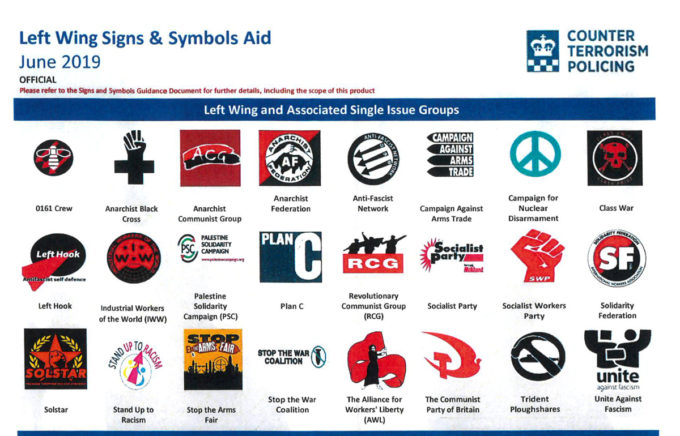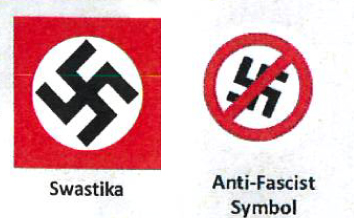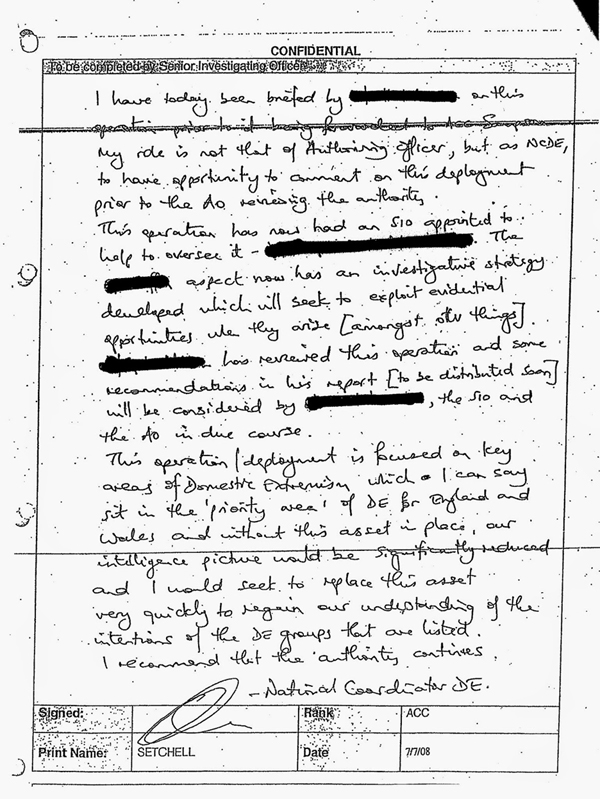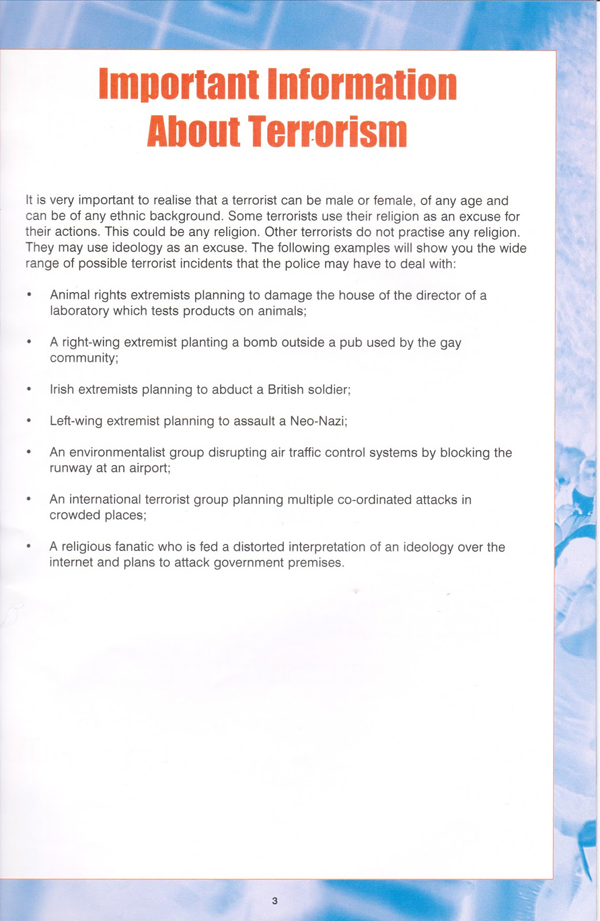Dissent Has Always Been ‘Extremism’

A page of symbols deemed extremist by counter-terrorism police
Earlier this month it was revealed that counter-terrorism police had put Extinction Rebellion (XR) on a list of extremist ideologies that should be reported to the authorities.
The booklet, Safeguarding Young People and Adults from Ideological Extremism, had been circulated by Counter Terrorism Policing South East in the south-east of England to a range of ‘statutory partners’.
In the aftermath of negative media coverage, counter-terrorism officials at a national level rapidly conceded that XR were not extremist, and this mistaken publication by local police was being withdrawn. This didn’t stop Home Secretary Priti Patel from continuing to defend the decision that the police had now admitted was wrong.
IT WASN’T A ONE-OFF ERROR
But last week we learned of a 2019 briefing issued by Counter Terrorism Policing across the whole of England listing signs and symbols of extremists. Alongside white supremacists (whose page of logos get a disclaimer explaining that not all symbols are of counter-terrorism interest, and things like runes may be law-abiding paganism), were many symbols of left wing, anti-war, anti-fascist and environmental causes – including XR. These outnumber the far-right symbols 2:1.

Liking or disliking a swastika is extremism, say counter-terrorism police
The swastika and the sign of a swastika crossed out are both listed as symbols of extremism. Caring about fascism at all, whether for or against, is classed as extremist.
Groups that are not only wholly non-violent but whose sole purpose is to decrease violence – such as Campaign Against the Arms Trade, Animal Aid and Stop the Arms Fair – were included.
The Campaign for Nuclear Disarmament’s symbol is featured even though it has long been a mainstream sign for peace. It can be found as unpolitical print on clothing and consumer items, used in a similar way to the taijitu yin-yang symbol or yellow smiley.
Perhaps the most pertinent inclusion is the clenched fist logo. It has been used by groups as diverse as Kach (an Israeli ultra-nationalist party banned from elections due to racism), Librarians Against DRM (US librarians opposing electronic copyright controls on e-books) and the Tom Robinson Band (late 1970s UK rock band best known for 2468 Motorway).

Left to right: Symbols for Kach, Librarians Against DRM, and the Tom Robinson Band
The clenched fist isn’t indicative of any specific ideology or tactic. It is a salute of solidarity and unity used in many circumstances. It has no fixed meaning beyond the defiance of established power. And it is precisely that which the political secret police regard as the common thread binding all those it brands as extremists.
As Netpol’s Kevin Blowe pointed out in the Guardian:
‘there is no legal definition of what “domestic extremism” even means, leaving the police with complete discretion in deciding what it covers. “Extremism” and “domestic extremism” are used interchangeably by the police to differentiate from terrorism. The current criteria is so broad and ambiguous that David Anderson, a former independent reviewer of terrorism legislation, has described it as “manifestly deficient” and last summer, the Home Office finally confirmed it had stopped using such terms. The police, as we have seen, have not.’
IT WASN’T ANYTHING NEW
The recent revelations aren’t news to those familiar with the forerunners of counter-terrorism policing, the political undercover units the Special Demonstration Squad (1968-2008) and the National Public Order Intelligence Unit (1999-2011).
These units, so beyond the pale that they’re the subject of a full-scale public inquiry set to begin in earnest in the summer, targeted exactly these sorts of ideas and activities. The Undercover Policing Inquiry has admitted that more than 1,000 groups were spied on over the 50 years. Put simply, there aren’t that many groups who can be a threat to public safety and national security.
The Inquiry refuses to publish the full list, and has only named 83 – less than half a group per officer deployed. Even with this paltry figure, it’s clear that – as with the counter-terrorism briefings – they share the same priorities. More officers have been deployed into antifascist groups than fascist (and for long periods).

Anton Setchell, National Co-ordinator Domestic Extremism, approves officer Mark Kennedy’s authorisation, 2008
In the face of stonewalling from the public inquiry that’s supposed to reveal the truth about spycops, the Undercover Research Group compiled a list of groups known to have been spied on by officers from those two units. They include organisations large and small, from open democratic trade unions to local animal welfare groups.
Leaked documents show that in 2008 the head of the spycops units, Anton Setchell, endorsed officer Mark Kennedy’s infiltrations of Climate Camp which was ‘sitting in the priority area for domestic extremism’. Meanwhile in 2011, a leaked email from Adrian Tudway, Setchell’s successor as chief of the political police, explains that the English Defence League are not considered extremists.
COUNTER-DEMOCRATIC POLICING
Public figures such as politicians have been spied on. At least ten Labour MPs had active files and in 2015 stood in the Commons to demand answers. They’ve had none.
Green Party peer Jenny Jones had an extensive file that began after she was elected to the Greater London Assembly in 2000 and continued while she was on a police scrutiny panel, the Metropolitan Police Authority. She was later told that her file had been wiped along with a lot of unnecessary ones but when she checked, a whistleblower reports that the majority of her retained file was hurriedly shredded and a sanitised version presented to her.
It’s not surprising that right wing Conservative Priti Patel defends the political police’s attitudes, it seems most parties left of the Conservatives and right of UKIP have been spied on. The confirmed list includes the Labour Party, Liberal Party, Green Party, Socialist Party, Socialist Workers Party, Independent Labour Party, Workers Revolutionary Party, and the British National Party.
ANYONE CAN BE AN EXTREMIST
Around 750,000 UK citizens are members of spied-upon parties. Another 4.5 million are in the kind of environmental groups that are targeted. Any one of these people could become the target for the invasion of their personal life, fitting up with a wrongful conviction, terminating their employment and/or harassment by uniformed police.
As 90 year old peace campaigner John Catt found out, you don’t need a criminal record to be singled out, and he had to endure a nine-year legal battle to get his file deleted.
Belinda Harvey wasn’t even a member of a political organisation but was still one of the women targeted for a relationship by a spycop, something the Metropolitan Police themselves admit is a ‘gross violation that causes significant trauma’.
The family of Stephen Lawrence only wanted the truth about their son’s murder yet they’re one of many groups of grieving loved ones who were left wanting. Police resources that should have been spent catching killers were instead used to secretly obstruct justice in order to protect the police’s reputation.

Page from 2012 Greater Manchester Police briefing conflating activism with terrorism
DISSENT = EXTREMISM = TERRORISM
Despite the uproar surrounding the exposure of spycops, there has been no serious change in political policing. It has actually been made worse. The police’s political and anti-terrorist units have been amalgamated and been rebadged. The same work carries on but with a more active conflation of political dissent with terrorism.
Even this month’s revelations about the counter-terrorism Prevent programme demonising climate protesters only confirms what was already known, rather than revealing anything new.
In 2012, Greater Manchester Police’s Prevent officer circulated a document describing examples of terrorism. The list included, and effectively equated, a neo-Nazi planting nail-bombs and climate protesters blockading an airport runway.
REPRESSION IS THE PURPOSE
The Safeguarding Young People and Adults from Ideological Extremism briefing says ‘adopting health-conscious and environmentally sustainable lifestyles’ can be an indicator of extremism. Counter-terrorism police say it’s extreme to try to ensure other people are able to have the basic essentials of life. Only by living unsustainably can you avoid being extremist. How has it come to this?
The political police exist to prevent and quell organised threats to the current power structures. They don’t differentiate between a threat to life and limb, a threat to the political status quo, a threat to corporate profit, and a threat to police credibility. They hold no regard for democracy or legality. Groups are targeted irrespective of whether they’re open or clandestine, their methods violent or peaceful, legal or illegal.
By the same token, the political police do not care whether their work is legal and democratic or not. They have orchestrated large numbers of miscarriages of justice over a long period. They have psychologically and sexually abused women they spied on. They have illegally supplied information on politically active people to an equally illegal construction industry blacklist to prevent those people from getting work.
They have no regard for whether the groups and people targeted are trying to make a better world not. They do this because they represent the vested interests threatened by activism. Though their repression is an outrage, it mustn’t be a discouragement. They see our power, even when we can’t see it ourselves. To defend democracy, we must end political policing.
